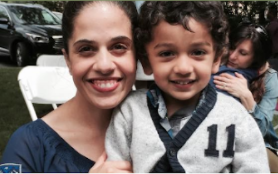Connecting Through Singing
 “Music helps us listen to each other,” said Joey Weisenberg, our musical Scholar-In-Residence who came to lead our Shabbat services on Fri March 1st. Joey Weisenberg is most recently the Creative Director of Mechon Hadar’s Rising Song Institute which aims to bring more inclusiveness to Jewish prayer and singing across the nation. He is a multi-instrumental musician, singer and composer who works with regular congregants in shuls across the nation in an effort to make music a joy filled experience that can be easily accessed by all.
“Music helps us listen to each other,” said Joey Weisenberg, our musical Scholar-In-Residence who came to lead our Shabbat services on Fri March 1st. Joey Weisenberg is most recently the Creative Director of Mechon Hadar’s Rising Song Institute which aims to bring more inclusiveness to Jewish prayer and singing across the nation. He is a multi-instrumental musician, singer and composer who works with regular congregants in shuls across the nation in an effort to make music a joy filled experience that can be easily accessed by all.
Sitting with us in a close circle, he asked the congregants to take part in singing a repetitive wordless melody called a niggun. Within minutes, we didn’t sing to complete our ritualistic prayers, but we harmonized. We sang louder and with such confidence that our voices seemed to reach the top of the A-line ceiling above us.
As Weisenberg began to introduce himself and his work to our synagogue, he insisted that we don’t just sit, but that we get close, stand, tap our feet and sway. He complimented our pews but said, “they keep us polite.” Chairs were brought closer and he sat in the middle of about 75 multi-aged congregants where he inspired imperfect singing. He valued our imperfect singing because it was genuine and a personal offer to the overall spirituality of the night.
I experienced the inclusiveness of the niggun we sang as a meditative chant that shifted my spirit and mental focus. I became part of something bigger than myself and felt swept away by the group’s melody. It was liberating to not have to remember too many words. I just closed my eyes and connected to the melodic sounds allowing them to clear the jumble of thoughts from my work life. As Weisenberg himself described it on Friday night, singing niggunim allows something in our spirit to be expressed that just can’t be captured in words.
I think the most powerful teaching move from Weisenberg was when he insisted that volunteers from our congregation lead our singing while he coached. He insisted that singing is led from the center of a circle, where the first and second voice are not considered the most important. It’s actually the third and fourth voice that inspire our communal spirit. He made sure that even with all his accreditation, scholarly knowledge and musical talents we knew that our collective was the most important soul in the room and not him. The niggun meditative singing brought forth the idea of doing some of our Shabbat singing in a more basic manner that allows us to connect to each other’s inner melodies where can really hear each other.

Beautifully expressed! We wish we had been there wirh you!
Beautifully expressed! We wish we had been there wirh you!